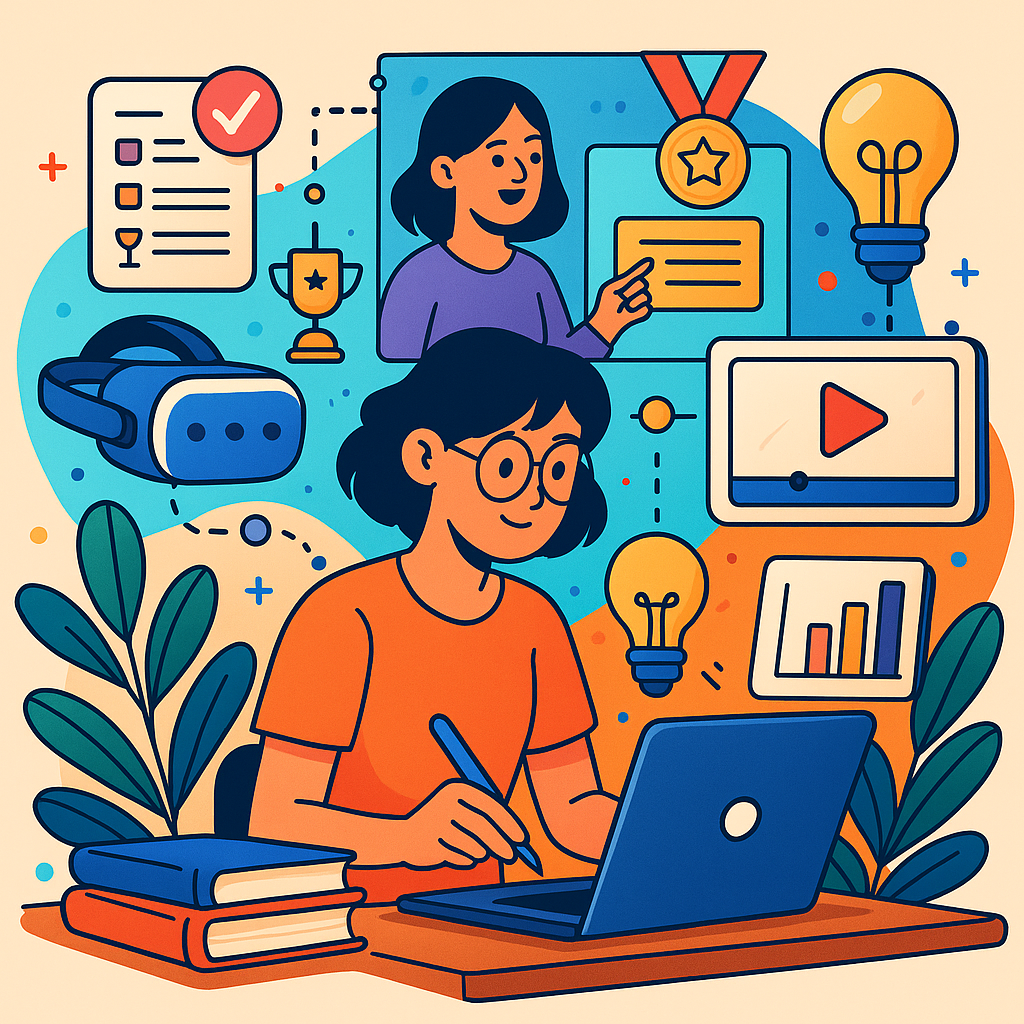The educational landscape is rapidly evolving, driven by technological advancements and changing learner expectations. Creating engaging educational content now requires a blend of innovation, personalization, and interactivity. This article explores the current trends and strategies that educators and content creators can adopt to captivate learners effectively.

1. Embrace AI-Powered Personalization
Artificial Intelligence (AI) has become a cornerstone in educational content creation, enabling personalized learning experiences that cater to individual student needs. AI algorithms analyze learners’ performance data to adapt content in real-time, ensuring that each student receives material suited to their learning pace and style.
Platforms like Squirrel AI and Microsoft’s Reading Coach exemplify this trend by offering tailored learning paths and instant feedback, enhancing student engagement and retention. According to a report by the Digital Learning Institute, AI-driven personalized learning systems are among the top education technology trends to watch in 2025. Digital Learning Institute
2. Integrate Gamification Techniques
Gamification transforms traditional learning by incorporating game elements such as points, badges, and leaderboards. This approach increases motivation and engagement by making learning interactive and fun.
Tools like Kahoot and Quizlet have gained popularity for their ability to turn quizzes into competitive games, fostering a dynamic learning environment. In fact, the global gamification market is projected to grow from $9.1 billion in 2020 to $30.7 billion by 2025, at a compound annual growth rate (CAGR) of 27.4%. Growth Engineering
3. Utilize Interactive Learning Tools
Interactive learning tools are essential for creating content that resonates with today’s tech-savvy students. These tools facilitate active participation and collaboration, making learning more effective.
Platforms such as Nearpod and Edpuzzle allow educators to create interactive lessons with real-time assessments, while Canva for Education enables the design of visually appealing educational materials. These tools support various learning styles and promote critical thinking skills. Strikingly
4. Incorporate Microlearning and Edutainment
Microlearning delivers content in small, focused segments, making it easier for learners to absorb and retain information. Edutainment combines education with entertainment, using storytelling and multimedia to enhance learning experiences.
This approach caters to the preferences of Gen Z and Alpha learners, who favor short, engaging content accessible via mobile devices. By integrating microlearning and edutainment, educators can create content that is both informative and captivating.
5. Leverage Virtual and Augmented Reality
Virtual Reality (VR) and Augmented Reality (AR) offer immersive learning experiences that can transport students to different environments or simulate complex concepts. These technologies enhance understanding by providing hands-on experiences in a virtual setting.
For instance, VR can be used to conduct virtual science experiments, while AR can overlay information onto physical objects, enriching the learning process. As these technologies become more accessible, their integration into educational content is expected to grow.
6. Focus on Social-Emotional Learning (SEL)
Social-Emotional Learning emphasizes the development of emotional intelligence, empathy, and interpersonal skills. Incorporating SEL into educational content helps students manage emotions, build relationships, and make responsible decisions.
Educational platforms are increasingly embedding SEL components into their curricula, recognizing its impact on academic performance and overall well-being. According to Education Week, schools are using social-emotional learning to address growing concerns about students’ behavior and ability to think and act independently. Education Week
7. Ensure Accessibility and Inclusivity
Creating content that is accessible to all learners, including those with disabilities, is crucial. AI-powered tools like Audemy provide personalized audio-based learning for blind and visually impaired students, adapting content to individual needs and preferences.
By prioritizing accessibility, educators can ensure that all students have equal opportunities to succeed, regardless of their abilities. The U.S. Department of Justice has issued new rules to remove accessibility barriers to technology tools and services for public school students with disabilities. Center for American Progress+1AP News+1
8. Adopt Adaptive Learning Systems
Adaptive learning systems use AI to adjust the difficulty and style of content based on student responses. This personalized approach helps identify areas where students struggle and provides targeted support to address those challenges.
Studies have shown that adaptive learning can significantly improve student outcomes by offering customized learning experiences that align with individual needs. AI-powered adaptive learning is ushering in a new era of education in 2025, enhancing the learning experience for students. eLearning Industry
9. Incorporate AI-Generated Content
Generative AI tools can assist in creating educational content such as quizzes, summaries, and even synthetic videos. These tools streamline the content creation process, allowing educators to produce high-quality materials efficiently.
For example, Duolingo has utilized AI to expand its language courses rapidly, demonstrating the potential of AI in scaling educational content. At an Axios event, Duolingo CEO Luis von Ahn emphasized the transformative impact of AI on education, particularly language learning. Axios
10. Emphasize Continuous Feedback and Assessment
Implementing systems that provide immediate feedback helps students understand their progress and areas for improvement. AI-driven assessment tools can analyze student performance and offer insights that inform instructional strategies.
By incorporating continuous feedback mechanisms, educators can create a responsive learning environment that adapts to student needs in real-time. According to a study by Education Perfect, involving nearly 20,000 students, there was a 47% improvement in response quality and increased student engagement with feedback when using AI tools.
References:
- Digital Learning Institute. (2025). Education Technology Trends to Watch in 2025. Retrieved from https://www.digitallearninginstitute.com/blog/education-technology-trends-to-watch-in-2025
- Growth Engineering. (2023). 19 Gamification Trends for 2023-2025: Top Stats, Facts & Examples. Retrieved from https://www.growthengineering.co.uk/19-gamification-trends-for-2022-2025-top-stats-facts-examples/Growth Engineering
- Strikingly. (2025). 7 Engaging Interactive Learning Tools for 2025. Retrieved from https://www.strikingly.com/blog/posts/7-engaging-interactive-learning-tools-for-2025
- eLearning Industry. (2025). Microlearning Is Changing The Way We Learn In 2025. Retrieved from https://elearningindustry.com/how-microlearning-is-changing-the-way-we-learn-all-you-need-to-knoweLearning Industry+3eLearning Industry+3eLearning Industry+3
- RexTheme. (2025). Virtual Reality in Education: What’s The Future?. Retrieved from https://rextheme.com/virtual-reality-in-education/RexTheme
- Education Week. (2025). Social-Emotional Learning 2025: New Priorities Emerge. Retrieved from https://www.edweek.org/leadership/social-emotional-learning-2025-new-priorities-emergeEducation Week
- American Progress. (2024). Ensuring Digital Accessibility in K-12 Schools in a Technology-Driven Era. Retrieved from https://www.americanprogress.org/article/ensuring-digital-accessibility-in-k-12-schools-in-a-technology-driven-era/Center for American Progress
- eLearning Industry. (2025). AI-Powered Adaptive Learning: Education In 2025. Retrieved from https://elearningindustry.com/ai-powered-adaptive-learning-ushering-in-a-new-era-of-education-in-2025eLearning Industry+2eLearning Industry+2eLearning Industry+2
- Axios. (2025). Axios Event: AI is “hugely transformational” for Duolingo and education, CEO says. Retrieved from https://www.axios.com/2025/04/04/axios-event-pittsburgh-local-ai-duolingo-educationAxios






